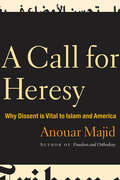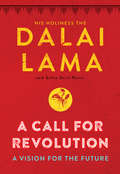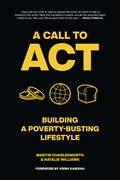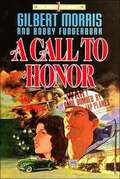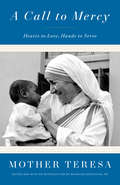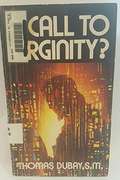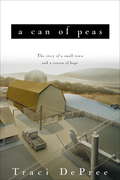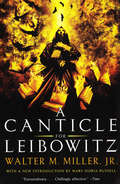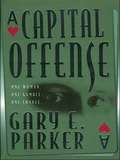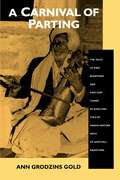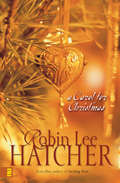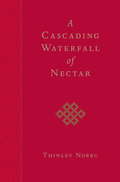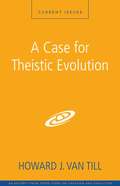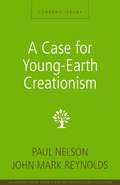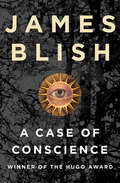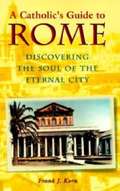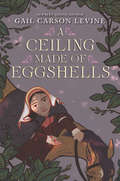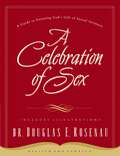- Table View
- List View
A Call for Heresy: Why Dissent Is Vital to Islam and America
by Anouar MajidA Call for Heresy discovers unexpected common ground in one of the most inflammatory issues of the twenty-first century: the deepening conflict between the Islamic world and the United States. Moving beyond simplistic answers, Anouar Majid argues that the Islamic world and the United States are both in precipitous states of decline because, in each, religious, political, and economic orthodoxies have silenced the voices of their most creative thinkers—the visionary nonconformists, radicals, and revolutionaries who are often dismissed, or even punished, as heretics.The United States and contemporary Islam share far more than partisans on either side admit, Majid provocatively argues, and this &“clash of civilizations&” is in reality a clash of competing fundamentalisms. Illustrating this point, he draws surprising parallels between the histories and cultures of Islam and the United States and their shortsighted suppression of heresy (zandaqa in Arabic), from Muslim poets and philosophers like Ibn Rushd (known in the West as Averroës) to the freethinker Thomas Paine, and from Abu Bakr Razi and Al-Farabi to Thomas Jefferson and Abraham Lincoln. He finds bitter irony in the fact that Islamic culture is now at war with a nation whose ideals are losing ground to the reactionary forces that have long condemned Islam to stagnation.The solution, Majid concludes, is a long-overdue revival of dissent. Heresy is no longer a contrarian&’s luxury, for only through encouraging an engaged and progressive intellectual tradition can the nations reverse their decline and finally work together for global justice and the common good of humanity.Anouar Majid is founding chair and professor of English at the University of New England and the author of Freedom and Orthodoxy: Islam and Difference in the Post-Andalusian Age; Unveiling Traditions: Postcolonial Islam in a Polycentric World; and Si Yussef, a novel. He is also cofounder and editor of Tingis, a Moroccan-American magazine of ideas and culture.
A Call for Revolution: A Vision for the Future
by Dalai Lama Sofia Stril-ReverTHE INTERNATIONAL BESTSELLER * A LIBRARY JOURNAL BEST BOOK OF THE YEAR * A SPIRITUALITY & PRACTICE BOOK AWARD WINNER* A NAUTILUS BOOK AWARD WINNERA Landmark Message from His Holiness the Dalai Lama: Are we ready to hear it? Are we ready to act?I call on you to confront the challenges of our era by rising up and embarking upon a revolution that has no precedent in human historyThis eloquent, urgent manifesto is possibly the most important message the Dalai Lama can give us about the future of our world. It’s his rallying cry, full of solutions for our chaotic, aggressive, divided times: no less than A CALL FOR REVOLUTION.
A Call to Act: Developing a Poverty-Busting Lifestyle
by Martin Charlesworth Natalie WilliamsEvery Action Can Make a DifferenceIn recent years churches have rediscovered the centrality of concern about poverty to the gospel of Christ. Yet we can still so easily fall into the trap of adding social action into our lives as an optional extra when convenient, rather than letting the heart of Jesus for justice for those in poverty affect every area of our lives and our discipleship.A practical tool for churches and small groups, and incorporating discussion questions and accompanying videos, A Call to Act demonstrates that, in order to engage with poverty and need, we must re-evaluate our own attitudes and adopt a poverty-busting lifestyle.There are undoubted challenges to embracing a life of simplicity but these are broken down into ideas for action. Whether getting up close to poverty, rejecting comfort in favour of compassion, or living with a more poverty-focused lifestyle, churches and individuals will be empowered to live out Jesus&’ principles of justice, mercy, and the care of creation within their own communities and the wider world.
A Call to Honor (The Price of Liberty #1)
by Gilbert Morris Bobby FunderburkBen Logan was filled with impossible dreams of success and far-off adventure. Always one of the "have-nots" in the small class-conscious town of Liberty, Georgia, he was alternately tolerated and rejected by those that called him "poor white trash" and ridiculed his father, an often-drunk pulpwood cutter. Part of Ben's dream comes true when the daughter of the richest man in town invites him into her self-centered world. Ben is haunted by the memory of her kiss, the soft wetness of her lips against his neck, her fragrance, and her unbearably blue eyes. But when circumstances force Ben to leave Liberty and join the Navy, the memory of that kiss goes with him, erasing thoughts of the other young woman he left behind: Rachel, the thin, freckle-faced daughter of a poor Pentecostal preacher. "God told me I'm going to be your wife," Rachel told Ben on the day he left Liberty. "Are you crazy" Ben scoffed at her. "I'd never marry you in a hundred years!" But everything changed--everything--on December 7,1941, when Ben Logan found himself in Pearl Harbor, leaning into a gun mount on the deck of the USS Arizona...
A Call to Mercy: Hearts to Love, Hands to Serve
by Mother Teresa Brian KolodiejchukPublished to coincide with Pope Francis's Year of Mercy and the Vatican's canonization of Mother Teresa, this new book of unpublished material by a humble yet remarkable woman of faith whose influence is felt as deeply today as it was when she was alive, offers Mother Teresa's profound yet accessible wisdom on how we can show mercy and compassion in our day-to-day lives. For millions of people from all walks of life, Mother Teresa's canonization is providentially taking place during Pope Francis's Extraordinary Jubilee of Mercy. This is entirely fitting since she is seen both inside and outside of the Church as an icon of God's mercy to those in need. Compiled and edited by Brian Kolodiejckuk, M.C., the postulator of Mother Teresa's cause for sainthood, A Call to Mercy presents deep yet accessible wisdom on how we can show compassion in our everyday lives. In her own words, Mother Teresa discusses such topics as: the need for us to visit the sick and the imprisoned the importance of honoring the dead and informing the ignorant the necessity to bear our burdens patiently and forgive willingly the purpose to feed the poor and pray for all the greatness of creating a "civilization of love" through personal service to others Featuring never before published testimonials by people close to Mother Teresa as well as prayers and suggestions for putting these ideas into practice, A Call to Mercy is not only a lovely keepsake, but a living testament to the teachings of a saint whose ideas are important, relevant and very necessary in the 21st century.
A Call to Mercy: Hearts to Love, Hands to Serve
by Mother Teresa Brian KolodiejchukPublished to coincide with Pope Francis's Year of Mercy and the Vatican's canonization of Mother Teresa, this new book of unpublished material by a humble yet remarkable woman of faith whose influence is felt as deeply today as it was when she was alive, offers Mother Teresa’s profound yet accessible wisdom on how we can show mercy and compassion in our day-to-day lives. For millions of people from all walks of life, Mother Teresa's canonization is providentially taking place during Pope Francis's Extraordinary Jubilee of Mercy. This is entirely fitting since she is seen both inside and outside of the Church as an icon of God's mercy to those in need. Compiled and edited by Brian Kolodiejckuk, M.C., the postulator of Mother Teresa’s cause for sainthood, A Call to Mercy presents deep yet accessible wisdom on how we can show compassion in our everyday lives. In her own words, Mother Teresa discusses such topics as: the need for us to visit the sick and the imprisoned the importance of honoring the dead and informing the ignorant the necessity to bear our burdens patiently and forgive willingly the purpose to feed the poor and pray for all the greatness of creating a “civilization of love” through personal service to others Featuring never before published testimonials by people close to Mother Teresa as well as prayers and suggestions for putting these ideas into practice, A Call to Mercy is not only a lovely keepsake, but a living testament to the teachings of a saint whose ideas are important, relevant and very necessary in the 21st century.
A Call to Virginity?
by Fr. Thomas DubayThis book offers women a theologian's view of virginal dedication, as well as reasons for choosing this lifestyle, by presenting a positive view of virginity.
A Can of Peas
by Traci DepreWeaving together the strong threads of family and friends in a pattern of grace, forgiveness, and kindness, A Can of Peas invites readers into a place where every day brings a new story and neighbors are more than just people who live down the road. Sometimes funny and often poignant, these vignettes will draw both men and women into the reassuring rhythms of life as it ought to be-and as it still is in the heart of America. After the death of his grandfather, Peter Morgan and his new bride, Mae, face a life-changing decision: should they embrace the career-chasing ambitions of their family and friends in St. Paul or accept the absurd challenge of saving the family farm in the Minnesota countryside? Enticed by the romance of a simple, quiet life, the Morgans set out to follow in the footsteps of Peter's grandparents. Soon, Peter is farming around the clock, barely one step ahead of failure as Mae struggles to find her place in Peter's life and in the community. Will the strain of saving the farm tear their marriage apart? Was it a mistake to dream?From the Trade Paperback edition.
A Canticle for Leibowitz
by Walter M. Miller Jr.The Flame Deluge was over, the earth was dead and all knowledge has been eradicated. In a desert, a monk unearths a link to 20th-century civilization, and with his colleagues, vows to preserve the ancient knowledge until mankind is ready to receive it.<P><P> Hugo Award winner.
A Canyon Springs Courtship
by Glynna KayeA Love Reunited Councilman Jake Talford is determined to protect his small Arizona town. Even if that means keeping a close eye on former sweetheart Macy Colston. Macy has come to Canyon Springs to get the scoop for her popular blog Hometowns with Heart. The rest of the town council hopes it will bring in the tourists. But Jake's worried she'll turn local gossip into public scandal. He and Macy once shared dreams of a future together. Now it's up to Jake to make her see what's most important in life-love, faith and truth.
A Capital Offense
by Gary ParkerLife smiles on Connie Brandon: law degree nearly in hand, a loving husband and two wonderful kids, a vibrant faith in God in a quiet Missouri town. But her quiet family life is rocked when her husband, Jack, turns up dead in the Missouri River -- a suicide, police say -- and then another woman claims to have been his mistress. Although grief-stricken, Connie's sharp legal mind locks on to the belief that her husband was murdered for his staunch opposition to riverboat gambling in the Missouri capital of Jefferson City. Yet as she searches for the truth, secrets about Jack emerge -- secrets of a past cloaked in riddles and danger; secrets that threaten her faith and her life unless she can piece it all together in time.
A Captain for Laura Rose
by Stephanie Grace WhitsonLaura Rose White's late father taught her everything he knew about piloting a Missouri River steamboat. He even named their boat after her. Despite that, it seems that Laura will forever be a "cub pilot" to her brother Joe, because in 1867, a female riverboat captain is unheard of. That is, until tragedy strikes and Laura must make the two month journey from St. Louis to Fort Benton and back in order to save her family's legacy, her home, and the only life she's ever known. The only way for her to overcome the nearly insurmountable odds is with the help of her brother's disreputable friend Finn MacKnight, a skilled pilot with a terrible reputation. Laura loathes having to accept MacKnight as her co-pilot, especially when she learns she must also provide passage for his two sisters. Straight-laced Fiona has a fear of water, and unpredictable Adele seems much too comfortable with the idea of life in the rough and tumble environment of the untamed river and the men who ply it. Though they are thrown together by necessity, this historic journey may lead Laura and the MacKnights to far more than they ever expected.
A Car That Goes Far
by Dina Rosenfeld Yael Mermelstein Vitaliy Romanenko Vasilisa RomanenkoA new car allows the narrator's family to do more mitzvos. Cartoonish illustrations depicting the family's Jewish neighborhood match the book's chipper tone.
A Carnival of Parting: The Tales of King Bharthari and King Gopi Chand as Sung and Told by Madhu Natisar Nath of Ghatiyali, Rajasthan
by Ann Grodzins GoldMadhu Natisar Nath is a Rajasthani farmer with no formal schooling. He is also a singer, a musician, and a storyteller. At the center of A Carnival of Parting are Madhu Nath's oral performances of two linked tales about the legendary Indian kings, Bharthari of Ujjain and Gopi Chand of Bengal. Both characters, while still in their prime, leave thrones and families to be initiated as yogis—a process rich in adventure and melodrama, one that offers unique insights into popular Hinduism's view of world renunciation. Ann Grodzins Gold presents these living oral epic traditions as flowing narratives, transmitting to Western readers the pleasures, moods, and interactive dimensions of a village bard's performance.Three introductory chapters and an interpretive afterword, together with an appendix on the bard's language by linguist David Magier, supply A Carnival of Parting with a full range of ethnographic, historical, and cultural backgrounds. Gold gives a frank and engaging portrayal of the bard Madhu Nath and her work with him.The tales are most profoundly concerned, Gold argues, with human rather than divine realities. In a compelling afterword, she highlights their thematic emphases on politics, love, and death. Madhu Nath's vital colloquial telling of Gopi Chand and Bharthari's stories depicts renunciation as inevitable and interpersonal attachments as doomed, yet celebrates human existence as a "carnival of parting."
A Carol for Christmas (Burke Family #1)
by Robin Lee HatcherWhat would you give up for love? For Carol, it was her passion to sing. But was her sacrifice worth it now that her marriage is crumbling? In this heartwarming novella, two people discover the true essence of Christmas and its power to rekindle the flames of love.
A Carol for Kent: Song of Suspense #3
by Hallee BridgemanA Ruthless Serial Killer Seeks to End a Love Song Eight Years in the Making. Assistant Commonwealth Attorney CAROL MABRY heads up an investigation into a string of stranglings in Virginia's capital. The serial killer known as Richmond Red remorselessly snuffs out beautiful young women with violin strings before ritually enshrining their lovely lifeless bodies inside a pentagram of blood red candles. Country music superstar BOBBY KENT makes an unscheduled return trip to his Virginia home for the first time in years. To his shock, he discovers that he and Carol have a young daughter, Lisa. His parents have kept Lisa hidden from him her entire life while simultaneously deceiving Carol about Bobby's interest in fatherhood. Angry and hurt over the deception, Carol and Bobby strive to cope with this newly discovered reality. They struggle to overcome harmful secrets and years of lies to decide whether they have a future. Neither of them realize how every waking moment they move closer to the serial killer who harbors an unnatural and deadly obsession. With the beautiful Carol locked in Richmond Red's sights, the clock is ticking down to her destruction. Will the two find love, or is their sonata striking a dangerous final chord?
A Cascading Waterfall of Nectar
by Thinley NorbuLike a spontaneous cascade of wisdom nectar, the open and natural words of Thinley Norbu Rinpoche, uncomplicated by scholarly elaboration, flow here in the tradition of the direct transmissions of Buddhas and Bodhisattvas of the past. Through commentary on the Preliminary Practices (Ngöndrö) prayer from the treasure text of the great master Tragtung Düdjom Lingpa, insights into many central practices emerge in order to deepen understanding of the foundations of Vajrayana Buddhism. Also included in the book is a commentary on Tsok Khang Dechen (Assembly Palace of Great Exaltation), the root text prayer of the second Kyabje Düdjom Rinpoche, Jigdrel Yeshe Dorje.
A Case For Kindness: 40 Ways to Love and Inspire Others
by Lisa BarrickmanInspired by the author's fortieth birthday celebration where she committed to forty days of intentional kindness, this book shares the ripple effect that changed an entire community. In less than a year, more than 20,000 separate acts of kindness took place as others embraced the endeavour. A Case for Kindness equips you to have that same impact on the lives of your own neighbors, family, and friends. In this book, you will find forty kindness practices that easily fit the margins of your day-to-day interactions. It is a forty-day journey that will have a lasting impact on the lives of others, while enriching your own life in the process.
A Case for Theistic Evolution: A Zondervan Digital Short
by Howard J. Van TillDerived from Three Views on Creation and Evolution, this digital short argues that Christians need not oppose evolution and that God in fact created the world through evolutionary processes. More specifically, Van Till proposes a position called fully gifted creation, which he defines as the understanding that God created the natural world with a built-in capacity to develop and evolve. With thorough attention paid to the philosophical, scientific, theological, and practical implications of the viewpoint, A Case for Theistic Evolution will be useful both to readers wanting a basic introduction to theistic evolution and to those wanting to more deeply consider their own convictions regarding it.
A Case for Young-Earth Creationism: A Zondervan Digital Short
by Paul Nelson John Mark ReynoldsDerived from Three Views on Creation and Evolution, this digital short provides a vivid defense for the view that God created the world relatively recently and in six days. Critical of current scientific consensuses, though not abrasively so, the authors present biblical, philosophical, and scientific supports for their perspective. Their clear argumentation makes this one of the best presentations of a historic if recently maligned viewpoint, one that will be useful to proponents and opponents alike.
A Case of Conscience
by James BlishFather Ruiz-Sanchez is a dedicated man -- a priest who is also a scientist, and a scientist who is also a human being. He has found no insoluble conflicts in his beliefs or his ethics... until he is sent to Lithia. There he comes upon a race of aliens who are admirable in every way except for their total reliance on cold reason; they are incapable of faith or belief.<P><P> Confronted with a profound scientific riddle and ethical quandary, Father Ruiz-Sanchez soon finds himself torn between the teachings of his faith, the teachings of his science, and the inner promptings of his humanity. There is only one solution: He must accept an ancient and unforgivable heresy -- and risk the futures of both worlds.<P> Hugo Award Winner.
A Case of Conscience (S. F. Masterworks Ser. #No.30)
by James BlishA space-traveling Jesuit priest confronts a moral but godless alien race in this Hugo Award–winning novel by the author of the Cities in Flight saga. Father Ruiz-Sanchez is a dedicated man, a Jesuit priest who is also a scientist, and a scientist who is also a human being. He doesn&’t feel any genuine conflicts in his belief system—until he is sent to Lithia. The reptilian inhabitants of this distant world appear to be admirable in every way. Untroubled by greed or lust, they live in peace. But they have no concept of God, no literature, and no art. They rely purely on cold reason. But something darker lies beneath the surface: Do the Lithians pose a hidden threat? The answers that unfold could affect the fate of two worlds. Will Ruiz-Sanchez, a priest driven by his deeply human understanding of good and evil, do the right thing when confronted by a race that is alien to its core? The Science Fiction Encyclopedia lauds A Case of Conscience as &“one of the first serious attempts to deal with religion [in science fiction], and [it] remains one of the most sophisticated. It is generally regarded as an SF classic.&” Readers of Isaac Asimov&’s Foundation Trilogy, Mary Doria Russell&’s The Sparrow, or Walter M. Miller Jr.&’s A Canticle for Leibowitz will find this award-winning novel a gripping, compelling exploration of some of the most intractable and important questions faced by the human species. Includes an introduction by Hugo and Nebula Award–winning author Greg Bear.
A Catholic's Guide to Rome: Discovering the Soul of the Eternal City
by Frank J. KornFrank Korn presents an insider's guide to the city. He describes not only the familiar churches, basilicas, and historic places, but also takes travelers on fascinating detours down back alleys to little-known, though very important sites. For both the public and the private Rome, he reveals the legends and traditions associated with each.
A Ceiling Made of Eggshells
by Gail Carson LevineIn A Ceiling Made of Eggshells, Newbery Honor-winning author Gail Carson Levine tells a moving and ambitious story set during the expulsion of Jews from Spain, about a young Jewish girl full of heart who must play her own role in her people’s epic history—no matter the sacrifice. Surrounded by her large family, Loma is happy living in the judería of Alcalá de Henares, Spain, and wants nothing more than to someday have a family of her own. Still, when her intimidating grandfather, her Belo, decides to bring her along on his travels, she’s excited to join him. Belo has the ear of King Ferdinand and Queen Isabella, and Loma relishes her adventures with him, adventures that are beyond the scope of most girls of the time. She soon learns just how dangerous the world is for the Jews of Spain, and how her grandfather’s influence keeps their people safe. But the older Loma gets, the more she longs to realize her own dreams—if Belo will ever allow her to leave his side.
A Celebration Of Sex: A Guide to Enjoying God's Gift of Sexual Intimacy
by Douglas RosenauDr. Douglas Rosenau is a licensed psychologist, and a Christian sex therapist who has for the past seventeen years used his training in theology and counseling to help Christian couples enrich and reclaim God's wonderful gift of sexuality within marriage.A Celebration of Sex answers specific, often unasked questions about sexual topics, presents married couples with detailed techniques and behavioral skills for deepening sexual pleasure and intimate companionship, and is an excellent tool for premarital education.Previous edition: 0785273662
